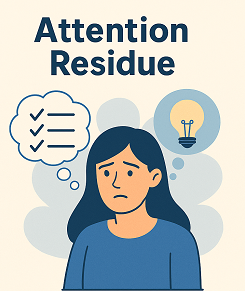You know the feeling. You’re finally in the zone — making progress, focused, maybe even enjoying the work. Then it happens: Attention Residue can interrupt your flow as lingering thoughts of previous tasks invade.
Ping.
Buzz.
“Hey, quick question…”
And just like that, you’re pulled out of your flow. You tell yourself you’ll get right back to it, but somehow, when you return, it feels like starting all over again.
Turns out, science backs this up.
The Real Cost of an Interruption
Research from UC Irvine found that when we’re interrupted, it takes an average of 23 minutes and 15 seconds to fully get back on track. This illustrates how attention residue from interruptions can greatly extend your loss of focus.
Yep. That “quick email” or “short Slack message” isn’t just a 30-second detour — it’s almost half an hour of lost focus.
And here’s the kicker: when people do get back to work, they often speed up to make up for lost time. That leads to more stress, more frustration, and more mistakes. Basically, interruptions don’t just slow us down — they make us worse at our jobs.
The Sneaky Problem of “Attention Residue”
Even when you think you’ve switched gears cleanly, part of your brain is still chewing on the thing you just left behind.
This is what psychologist Sophie Leroy calls attention residue. Imagine it like mental leftovers: when you jump from Task A to Task B, a slice of your attention is still stuck on Task A.
If Task A was unfinished (which it usually is when we’re interrupted), the residue is even stronger. That means your brain is half-distracted, even when you’re trying to focus. Attention residue makes it hard to immerse yourself in Task B.
Why This Matters Today More Than Ever
Between smartphones, open offices, endless notifications, and the expectation to be “always available,” we live in the golden age of interruptions.
But here’s the truth: every time you give in to one, you’re not just losing a minute. You’re losing quality thinking time. You’re trading deep focus for shallow, scattered work.
Over the course of a day — or a week — those little pings add up to hours of wasted energy, largely due to the complication of attention residue.
How to Fight Back
The good news? You don’t have to accept constant distraction as normal. Here are a few simple ways to protect your focus:
- Silence the noise. Turn off notifications when you’re doing deep work.
- Batch your responses. Check email or chat at set times instead of constantly.
- Finish before you switch. Wrap up small tasks before jumping to something new.
- Create focus blocks. Give yourself 60–90 minutes of uninterrupted work time to minimize attention residue.
Bottom Line
Interruptions aren’t just annoying — they’re costly. Science shows they can steal over 20 minutes of focus every time, and leave behind mental residue that drags you down even longer.
So the next time you feel that itch to check your phone or answer a quick ping, remember: you’re not just giving away a few seconds. You might be giving away your best work, due to the sneaky problem of attention residue.
Partner with Ad Ops Solutions
Trust your business with some of the most experienced advertising operations professionals for success with your next project. Consider our managed ad ops service for optimal results.
